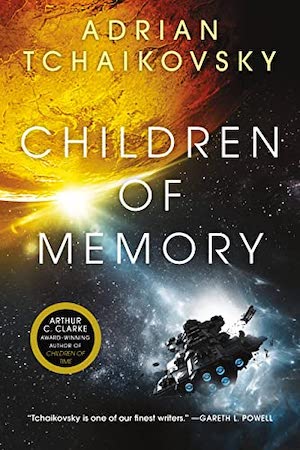Children of Memory by Adrian Tchaikovsky
My rating: 5 of 5 stars
In his Arthur C Clarke Award-winning novel, Children of Time, Adrian Tchaikovsky began a millennia-spanning story of failed and not-so-failed terraforming projects and the manipulation and ‘uplift’ of a growing number of non-human species. The first novel in the series plotted the evolution of enhanced, intelligent (and massive) portiid spiders, on a planet originally slated for human colonisation, who battle an incoming ship of human colonists/ refugees from the cataclysmic collapse of Earth’s civilisation, before forging an alliance with them for their mutual benefit. In the follow up novel, Children of Ruin, a group of humans and portiids travel to a new system showing signs of life and discover a warring civilisation of uplifted octopuses as well as encountering – almost catastrophically – a form of alien microbial life that has a nasty habit of colonising and taking over any intelligence it encounters. Eventually, once again, an alliance is formed between these very different intelligences (which shows how incredibly optimistic the series is).
Children of Memory begins with a combined group of humans, portiids, octopuses, the microbial life (known as Nodans) instantiated in a custom-grown human female body called Miranda, and a newly discovered intelligent species (or are they) of corvids, travelling to the planet of Imir where another human colony was thought to have been established.
The novel cuts between preparations by the multi-species crew to infiltrate and surveil the human colony; the original colonists’ approach, landing and terraforming attempts on Imir; and the problems faced by Miranda and the others trying to work out how to help the colonists’ descendants who are facing slow starvation. While Miranda is the main point of view character for the infiltrating crew, a young girl colonist called Liff provides much of the narrative of how the colony developed and currently functions. Liff is also a devotee of fairy tales and listens avidly to the adults talking about ‘watchers’ and ‘seccers’, who many in the colony believe are other colonists hiding ‘out there somewhere’ and scheming to bring the colony down. It seems like paranoia and Miranda and crew can find no trace of these others. Liff also believes there’s a witch who lives in the woods and she’s determined to confront her to find out what happened to her grandfather, who was also the pilot of the colony ship and who disappeared many years ago.
But not everything is as it seems and increasingly for Liff – and for Miranda and the others – events and memories don’t quite match up. There’s a growing discontinuity that most other colonists seem oblivious too and the reason for it is hard to fathom. What follows is a puzzle box of a novel, with Tchaikovsky in tight control of how the storyline pays out information in each narrative strand, delivering delightful jolts of disorientation for the reader as we try to figure out what the hell is going on. In amongst the mystery there’s a fascinating dissection of what it means to be sentient, the different modes of sentience that can arise and how easy it is to ascribe sentience to something when it’s not really there.
As a result, Children of Memory engages both the heart and the mind and the startling finale not only unravels the mystery of Imir’s colony in a satisfying way but adds yet another facet to the ongoing philosophical investigation at the centre of the novel.
View all my reviews


